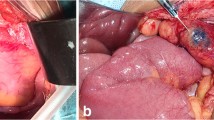Abstract
Unlike in breast cancer and melanoma, sentinel lymph node mapping in colon cancer is primarily used as an aid to the pathologist for accurate nodal staging. The study was undertaken to review the incidence of micro-metastasis and its impact on survival when treated with chemotherapy. The study was also undertaken to see if SLNM could guide limited colon resection in early T stage tumor as a paradigm shift. SLNM was done by subserosal injection of a blue dye. SLNs were ultra-staged by multilevel sectioning and remaining Specimen was then examined by conventional method. For the last 245 patients the specimen was divied ex vivo into two segments as segment A containing the tumor bearing portion of the colon and SLNs with attached mesentery, while segment B include distal part of the colon with attached mesentery. Nodal staging was separately examined. Of the 354 Pts, SLNM was successful in 99.9% of Pts with an average no of SLN/ Pt = 2.8 and total nodes 17.8/pt. Survival was directly related negatively with stage and nodal status. Pts with +ve LN did much better with chemotherapy than without chemotherapy. With 245 Pts, specimen A Vs B, no Pts had +ve node in specimen B with −ve LN in specimen A. SLNM results in more node/Pt, more positive node/Pt ,and more micro-metastasis who when treated with chemotherapy survive longer. Limited segmental resection in early T stage is possible when done with guidance by SLNM without compromising biology.


Similar content being viewed by others
Data availability
All patients included in this study are prospectively followed according to the institution IRB protocol organized into Excel spread sheet and data would be available upon reasonable request.
References
Ward E, Sherman R, Henley S, Jemal A, Siegel D, Feuer E et al (2019) Annual report to the nation on the status of cancer, featuring cancer in men and women age 20–49 years. JNCI 111(12):1279–1297
Ong M, Schofield J (2016) Assessment of lymph node involvement in colorectal cancer. World J Gastrointest Sur 8(3):179
Weixler B, Warschkow R, Güller U, Zettl A, von Holzen U, Schmied B et al (2016) Isolated tumor cells in stage I & II colon cancer patients are associated with significantly worse disease-free and overall survival. BMC Cancer. https://doi.org/10.1186/s12885-016-2130-7
Protic M, Stojadinovic A, Nissan A, Wainberg Z, Steele S, Chen D et al (2015) Prognostic effect of ultra-staging node-negative colon cancer without adjuvant chemotherapy: a prospective national cancer institute-sponsored clinical trial. J Am Coll Surg 221(3):643–651
Yun H, Kim H, Lee W, Cho Y, Yun S, Chun H (2009) The necessity of chemotherapy in T3N0M0 colon cancer without risk factors. The American Journal of Surgery 198(3):354–358
Jin M, Frankel W (2018) Lymph node metastasis in colorectal cancer. Surg Oncol Clin N Am 27(2):401–412
van der Zaag E, Bouma W, Tanis P, Ubbink D, Bemelman W, Buskens C (2012) Systematic review of sentinel lymph node mapping procedure in colorectal cancer. Ann Surg Oncol 19(11):3449–3459
Mescoli C, Albertoni L, Pucciarelli S, Giacomelli L, Russo V, Fassan M et al (2012) Isolated tumor cells in regional lymph nodes as relapse predictors in stage I and II colorectal cancer. J Clin Oncol 30(9):965–971
Nicholl M, Elashoff D, Takeuchi H, Morton D, Hoon D (2011) Molecular upstaging based on paraffin-embedded sentinel lymph nodes. Ann Surg 253(1):116–122
Rahbari N, Bork U, Motschall E, Thorlund K, Büchler M, Koch M et al (2012) Molecular detection of tumor cells in regional lymph nodes is associated with disease recurrence and poor survival in node-negative colorectal cancer: a systematic review and meta-analysis. J Clin Oncol 30(1):60–70
Saha S, Wiese D, Badin J et al (2000) Technical details of sentinel lymph node mapping in colorectal cancer and its impact on staging. Ann Surg Oncol 7:120–124. https://doi.org/10.1007/s10434-000-0120-z
Sfeclan MC, Vîlcea ID, Barišić G, Mogoantă SŞ, Moraru E, Ciorbagiu MC, Vasile I, Vere CC, Vîlcea AM, Mirea CS (2015) The sentinel lymph node (SLN) significance in colorectal cancer: methods and results. General report. Rom J Morphol Embryol 56(3):943–947 (PMID: 26662126)
Saha S, Elgamal M, Cherry M, Buttar R, Pentapati S, Mukkamala S, Devisetty K, Kaushal S, Alnounou M, Singh T, Grewal S, Eilender D, Arora M, Wiese D (2018) Challenging the conventional treatment of colon cancer by sentinel lymph node mapping and its role of detecting micrometastases for adjuvant chemotherapy. Clin Exp Metastasis 35(5–6):463–469. https://doi.org/10.1007/s10585-018-9927-5 (Epub 2018 Aug 16 PMID: 30116938)
Takeuchi H, Kitagawa Y (2015) Sentinel lymph node biopsy in gastric cancer. Cancer J 21(1):21–24. https://doi.org/10.1097/PPO.0000000000000088
Wiese D, Sirop S, Yestrepsky B, Ghanem M, Bassily N, Ng P, Liu W, Quiachon E, Ahsan A, Badin J, Saha S (2010) Ultrastaging of sentinel lymph nodes (SLNs) vs non-SLNs in colorectal cancer—do we need both? Am J Surg 199(3):354–358. https://doi.org/10.1016/j.amjsurg.2009.08.032
Author information
Authors and Affiliations
Corresponding author
Additional information
Publisher's Note
Springer Nature remains neutral with regard to jurisdictional claims in published maps and institutional affiliations.
Presented at the 8th International Cancer Metastasis Congress in San Francisco, CA, USA from October 25–27, 2019 (http://www.cancermetastasis.org). To be published in an upcoming Special Issue of Clinical and Experimental Metastasis: Novel Frontiers in Cancer Metastasis.
Rights and permissions
About this article
Cite this article
Saha, S., Philimon, B., Efeson, M. et al. The role of sentinel lymph node mapping in colon cancer: detection of micro-metastasis, effect on survival, and driver of a paradigm shift in extent of colon resection. Clin Exp Metastasis 39, 109–115 (2022). https://doi.org/10.1007/s10585-021-10121-y
Received:
Accepted:
Published:
Issue Date:
DOI: https://doi.org/10.1007/s10585-021-10121-y




